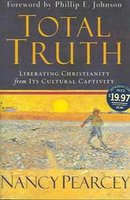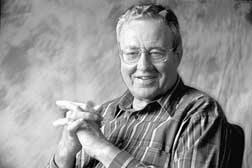
Lesslie Newbigin is one of the most influential 20th-century Christian thinkers in the field of missions. He was a missionary to India, but made the greatest impact in the West as a theologian. As a Christian statesman, active in the World Council of Churches, he gained the hearing of liberals, Catholics and a legion of evangelicals deeply impressed with his works.
Newbigin was born in 1909 into a wealthy Presbyterian family. During schooling years he struggled with doubt and lost his faith. Gifted with a clear, critical mind, he majored in economics and geography at Cambridge.
One night, as he lay in bed, he had a visionary experience of the cross which embraced heaven and earth. This conversion experience left such deep impression on his thought and life direction that he decided to study theology. He became involved in the Student Christian Movement (SCM) where he met his future wife, Helen Henderson, the daughter of a mission worker in India. It was his acquaintance with William Temple which led him to a lifelong passion for the ecumenical movement.
When the time came for him to decide on a career, he set forth for south India in 1936 as a missionary. He immediately sought to learn the Tamil language and understand the culture and religion of India by reading the Svetasvara Upanishad in the original language.
When Lesslie Newbigin returned to the West after 35 years, he took up pastorate at a struggling congregation in Birmingham. To his astonishment, he found native England a hostile mission field. It was during this period that his influential books on the gospel and modernity were written.
As a lifetime cross-cultural missionary, he knew the twin dangers of succumbing to either irrelevance or syncretism. In India, Hindus may worship Jesus on Christmas Day but He is perceived as one among a pantheon of deities. Similarly, in the West, the gospel has been co-opted by the modern dichotomy of ‘public facts’ ascertained by science over against ‘personal values’ speculated by religion. Surrendering the public square, the church has retreated into a private, spiritual ghetto. As part of his legacy, Newbigin challenged the Western church to break away from its cultural captivity to a secular, post-Enlightenment worldview.

The cure, however, is neither a remarriage of church and state vis-à-vis Constantine’s model nor a centralized Sharia regulating all of life. He calls for a ‘committed pluralism’ like the scientific community where each member is free to pursue her research within the tradition of what has been established. When disagreements arise, further experiment and argument are conducted, implying truth can be known. In this model, the church could publicly engage the world without being coercive. Even as violent religious fundamentalism is mounting, genuine unity of humankind can never be achieved through a pluralism that abandons the possibility of knowing the truth, by which alone humankind can be one.
Newbigin would insist that “truth is not a doctrine or a worldview or even a religious experience… it is the man Jesus Christ in whom God was reconciling the world. The truth is personal, concrete, historical”.

Leaning on Michael Polanyi’s philosophy, he asserted that there is no knowing without believing or personal commitment. All knowledge, including scientific ones, is based on a measure of faith and tradition. As such, the Enlightenment ideal of pure objectivity and neutrality is an unattainable myth. Ironically, the quest for indubitable certainty rooted in man’s rationality resulted in nihilism and agnosticism which eventually put science itself in jeopardy.
Therefore, we should be bold as the gospel is as much a public truth as the discovery of the scientist. Without embarrassment, the Christian should testify 'with universal intent'. This calls for a ‘declericalizing of theology’, where laypeople in every facet of life – media, politics, business, education and others – are enabled to challenge the prevailing assumptions of society in light of the gospel . Theology should not be reserved for pastors and scholars only!
However, Newbigin does not favor any form of apologetics which seeks to satisfy the standards of rationality within a hostile and alien plausibility structure. For example, one may have watched documentaries defending biblical miracles by insisting how they could be explained nicely by scientific laws. Science has become the ultimate authority.
Favoring an approach that looks similar to Reformed epistemology, he wrote, “The proper form of apologetics is the preaching of the gospel itself and the demonstration—which is not merely or primarily a matter of words—that it does provide the best foundation for a way of grasping and dealing with the mystery of our existence in this universe."
Rather than endorsing culture, the church must demonstrate to the world what it’s like when a community of people lives under God’s reign. The church’s proclamation, kerygma, must be carried out in the context of authentic community (koinonia) and service to the world (diakonia). The life of Christians should be integrated interpreters of the gospel as word, deed and sign. Only then can an alternative plausibility structure can be created by congregations who believe, proclaim, embody and enact the story of God’s mighty acts of creation and redemption. He described justice to the poor and care for creation as urgent areas to be addressed in the new millennium.

Since much has been said about an emerging postmodern culture, it may be worthwhile to explore Newbigin’s view on this issue. Undeniably, truth does not hang in thin air apart from history, language and particular human culture. However, he would insist that this does not entail the false assertion that no culturally-embodied truth claim “makes contact with a reality beyond the human mind”. While he agrees with the postmodern replacement of ahistorical, disembodied truth with a Story, he denies the postmodern skepticism that there is no overarching truth among the many ‘mere’ stories. Again, he wrote, “The church’s affirmation is that the story it tells, embodies and enacts is the true story and that others are to be evaluated by reference to it.”
Reading Newbigin’s works is dangerous business. It puts fire in the intellect, courage in the heart and motivation for action for the universal mission of Christ to a despairing world. A modern-day prophet has walked amongst us. We would do well to rally to his call to leave our privatized ghettos and ride forth to engage our pluralistic culture.
Bibliography
A Walk Through the Bible, SPCK/Westminster Knox, 1999
A Word in Season: Perspectives on Christian World Mission, St Andrew Press/Eerdmans, 1994
Discovering Truth in a Changing World, Alpha International, 2003
Foolishness to the Greeks: The Gospel and Western Culture, SPCK, 1986
Living Hope in a Changing World, Alpha International, 2003
Proper Confidence: Faith, Doubt and Certainty in Christian Discipleship, SPCK, 1995
The Gospel in a Pluralist Society, SPCK/Eerdmans, 1989
The Household of God, 1953, reprinted by Paternoster, 1999
The Open Secret: An Introduction to the Theology of Mission, SPCK/Eerdmans, 1978
The Other Side of 1984: Questions for the Churches, WCC Publications, 1983
Trinitarian Doctrine for Today's Mission, 1963, reprinted by Paternoster, 1999
Truth and Authority in Modernity, Trinity Press International, 1996
Unfinished Agenda: an Updated Autobiography, St Andrew Press, 1993






















